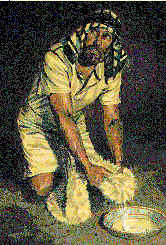
“Only YOU can stop disease-We recommend you wash your hands five times before you leave our restroom.”
Okay I made that up, but signs like that could be in the restrooms soon. People have stopped shaking hands, starting wearing masks, and might die of either swine flu or embarrassment if they would get caught forgetting to cough into their elbows. Life is getting strange.
When I saw this picture, it made me think that the stress of H1N1 panic, and hand washing, and sanitizing all things, in general, is starting to get a bit blown out of proportion…maybe to über hyper stage. I’m thinking, maybe a cultural fetish, or collective neurosis?
I’m all for clean hands. It really is important for good health and hygiene. (I’ve completely stopped just licking my fingers clean each day, in fact, just like a few people in my neighborhood have. If you’re wondering about bed bugs, Schuylkill could be a hot spot, don’t doubt it.)
But please-be assured, even with all the hype, H1N1 is very similar to the typical flu. It spreads very easily, many will get it, and some casualties will come, but mainly to the very old and the very young, and the ill.
It all had me wondering, Do people really wash their hands after using the facilities, or just when others are looking? I found this information below, after I started looking.
Here is an interesting article from cleanlink.com. It might make you want to bring your own paper towels along with you, wherever you go too!
Survey: Handwashing Statistics and Paper Towel Preferences
In an online survey conducted this spring, 94 percent of U.S. adults said they always wash their hands after visiting a restroom. However, when asked what percentage of other people they thought washed their hands each time after using a public restroom, 99 percent of U.S. adults felt that other people don’t do so each time, and almost half (48 percent) felt that people wash their hands less than 50 percent of the time after using a restroom.
Not surprisingly, visiting a public restroom is the situation that ranks highest in terms of health and hygiene concerns for U.S. adults. Asked during which situations they would be most concerned about health and hygiene risks, adults selected:
• Visiting a public restroom, 44 percent
• Preparing food or meals, 26 percent
• Contact with other adults, 9 percent
Other answers were: contact with babies/children, 7 percent; contact with animals, 3 percent; other, 2 percent; and not sure, 8 percent.
“Clearly people think public restrooms present a hygiene risk and claim they are washing their hands after using those restrooms,” said Mike Kapalko, Environmental and Tork Services Manager, SCA Tissue North America. “But their observations of others in public restrooms indicate that a large percentage of them are not actually doing so.”
The survey results show that most people, given a choice in a public restroom, would prefer to dry their hands with paper towels. Asked how they would prefer to dry their hands in a public restroom if they had a choice, among those who visit public restrooms: 55 percent selected paper towels followed by high velocity jet air dryer, 25 percent; hot air dryer, 16 percent; linen or cloth towel, 1 percent; and not sure, 2 percent.
The majority of respondents, 59 percent, also selected paper towels as the fastest method for drying hands, followed by: high velocity jet air dryer, 25 percent; linen or cloth towel, 8 percent; hot air dryer, 4 percent; and not sure, 4 percent.
Asked what they thought was the recommended length of time to actively wash hands with soap and water after using the restroom, 38 percent said 30 seconds and 28 percent said 20 seconds, followed by: 60 seconds, 14 percent; over 60 seconds, 8 percent; 40 seconds, 6 percent and 10 seconds, 6 percent.
‘The recommended procedure for washing hands in restrooms is to wet them, then thoroughly wash with soap for 20 seconds before rinsing off and drying them completely with a paper towel,” said Kapalko. “If faucets are not touchless, it is further recommended that the paper towel be used to shut them off to keep from re-contaminating their hands.”
The survey also asked questions to determine opinions on the most hygienic and effective ways for drying hands and reducing bacteria levels. In both cases, the opinions reflected in this poll have been disproved in a controlled experiment conducted late last year by Westminster University in London.
Asked for the most hygienic method for drying wet hands, respondents selected: high velocity jet air dryer, 41 percent; paper towel, 31 percent; and hot air dryer, 20 percent. Not sure was selected by 6 percent and linen or cloth by 2 percent.
Asked to rate each method as extremely, very, fairly, somewhat, or not at all effective in drying hands and reducing bacteria levels, poll respondents gave extremely or very effective ratings to::
• High velocity jet air, 65 percent of respondents
• Paper towels, 53 percent
• Hot air dryer, 50 percent
• Air drying or drip drying, 19 percent
• Linen or cloth towels, 15 percent
“These opinions giving high marks to hot air and jet air dryers are fairly widespread among consumers, but scientific research shows that paper towels are not only more hygienic and effective but that hot air and jet air dryers actually do more harm than good when it comes to reducing bacteria in public washrooms,” said Kapalko.
“Controlled experiments conducted in December 2008 by scientists at the University of Westminster found that paper towel drying reduced the average number of bacteria on the finger pads by up to 76 percent and on the palms by up to 77 percent,” Kapalko said. “By comparison, electric hand dryers actually caused bacteria counts to actually increase.”
Test results of the Westminster study showed:
• Traditional warm air dryers increased the average number of bacteria by 194 percent on the finger pads and by 254 percent on the palms.
• Jet air dryers increased the average number of bacteria on the finger pads by 42 percent and on the palms by 15 percent.
The scientists also carried out tests to establish whether there was the potential for cross contamination of other washroom users and the washroom environment as a result of each type of drying method. They found:
• The jet air dryer, which blows air out of the unit at claimed speeds of 400 mph, was capable of blowing micro-organisms from the hands and the unit and potentially contaminating other washroom users and the washroom environment up to 6.6 feet away.
• Use of a traditional warm air hand dryer spread micro-organisms up to 31.5 inches from the dryer.
• Paper towels showed no significant spread of micro-organisms.
“The Westminster results confirmed previous studies that show thorough hand drying with a paper towel is not only the most effective way to dry hands and reduce bacteria but also the most hygienic when it comes to preventing the spread of bacteria in public restrooms,” Kapalko said.
The commissioned survey was conducted by Harris Interactive on behalf of the Tork brand of SCA Tissue North America and drew 2,516 U.S. adult respondents 18 or older — 46 percent male and 54 percent female. It was conducted Feb. 26 through March 2, 2009.




